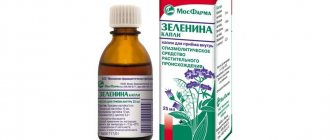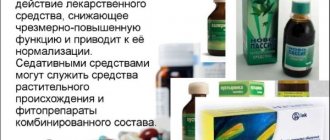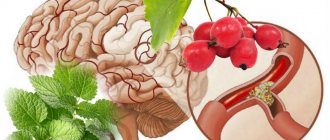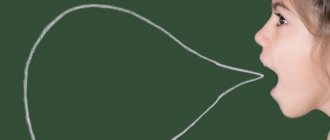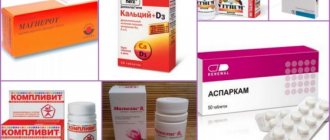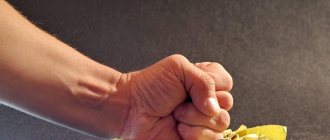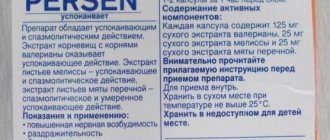Sedative medications for a child under one year old at night
If the baby is healthy, then the best sedative for him will be his mother’s breast, a lullaby and a calm atmosphere in the house. But this is ideal. And sometimes such options do not work, and you have to resort to choosing medications. First of all, you need to go to an appointment with a pediatrician, and maybe a neurologist. Doctors may prescribe the following medications for your baby at night:
- Phenibut. This sedative is quite serious. But it can be prescribed for children under 12 months. The drug helps eliminate anxiety, fear and irritability in the baby. But at the same time, it also causes allergies. It is possible to become addicted to the medicine. Therefore, it is prescribed to babies in very small doses.
- Pantogam. It has proven itself to be an effective remedy for relieving increased muscle tone. There are two dosage forms: syrups and tablets.
- Tenoten for children under 12 months is prescribed by pediatricians for increased excitability, cerebral circulatory disorders, and intoxication. Although the instructions do not recommend giving it to children under three years of age.
- Notta is an effective anti-anxiety drug that significantly improves a child's sleep and makes him more restful during the day. The drug belongs to the homeopathic category. Release forms: sedative drops and tablets. The first is preferred due to ease of use.
- Glycine is a natural drug that is an amino acid. It is recommended for children and their mothers.
Universal drugs for sedation include Citral and Magne B6.
In exceptional cases, pediatric neurologists prescribe tranquilizers to infants. These are Tazepan, Elenium, Sibazon. According to the instructions, they can only be prescribed to children from the age of five, but as an exception, according to indications and under the supervision of a doctor, this is done in tiny doses.
Calcium supplements are also often recommended by pediatricians, because a deficiency of the substance leads to irritability and poor sleep for the baby.
Sedatives for children over one year old
Sedatives for children are becoming increasingly popular among parents. Some mothers and fathers give them to their babies on the advice of a doctor, others look for them on their own. Drugs that reduce the excitability of the nervous system can cope with many problems. What effective and safe remedies exist for children?
Why are sedatives needed?
Increased excitability, anxiety, and tearfulness of a child are quite a serious problem for his parents.
In children, this condition often leads to poor sleep, and in adolescents – to problems in school and social life. Hysterics and whims do not add harmony to the family.
In an attempt to somehow regulate the situation, mothers and fathers turn to specialists, hoping to receive much-needed help.
Neurologists and pediatricians often prescribe sedatives to children.
Sedatives inhibit all processes occurring in the central nervous system, removing excessive excitability and hyperactivity of the child.
These drugs normalize sleep, eliminate tearfulness and the desire to throw a tantrum out of nowhere. Sedatives also help children adapt to new environments, for example, when attending kindergarten or school.
Types of sedatives for children
All sedative drugs can be divided into several groups:
- medications;
- herbal preparations;
- homeopathic remedies.
Drugs from the first group should only be prescribed by a doctor. Such drugs are often used for various organic diseases of the central nervous system and the consequences of perinatal brain damage.
Many of these sedatives have serious side effects.
By using such drugs on the recommendation of a neighbor or young mothers from forums, parents risk serious health problems for their child.
Advice
Follow your doctor's instructions strictly and do not exceed the dosage of the recommended drug!
Herbal remedies are herbal mixtures or medicines based on natural ingredients. Such sedatives are very popular among parents because they have a significantly smaller list of side effects. Many herbal remedies can be brewed as a tea and given to your child to drink several times a day.
Useful: First aid at home for diaper allergies in children
There is more debate about the benefits of homeopathic medicines. Official medicine does not recognize these drugs, claiming that their effect is no different from the placebo effect.
Homeopathic medicines contain such small amounts of active ingredients that the advisability of their use remains a big question.
Despite this, many parents prefer homeopathy, arguing that these remedies cope better than many others with increased excitability in the child.
In what form should the sedative be given? Parents of infants should give preference to medications in the form of syrups or soluble powders. At 2 years old, you can offer your child a sedative in the form of tea. After 5 years, many children chew and swallow tablets well. Capsules are allowed to be given to adolescents 12 years of age and older.
Medications
This sedative from the group of nootropics is approved for use from birth, but pediatricians do not recommend giving Phenibut to children under two years of age.
The drug has very multidirectional effects, and it is not always possible to predict exactly how the drug will affect the child’s body. At 2 years of age, Phenibut is prescribed for hyperactivity, excitability and tearfulness.
In adolescents, this medicine is recommended for use in cases of insomnia, anxiety and neuroses.
The course of treatment with Phenibut ranges from 2 to 6 weeks. If it is necessary to repeat therapy, you should take a break for 2-4 weeks. Cancellation of the drug occurs gradually, with a gradual reduction in dosage. This scheme allows brain cells to adapt to new conditions and learn to independently produce the necessary substances.
Phenibut is available in the form of powders and tablets. The drug is taken orally after meals. In the first days from the start of treatment, increased drowsiness and lethargy are possible. Such symptoms are a manifestation of adaptation to the drug and will soon go away on their own.
The drug is a nootropic and its mechanism of action is similar to Phenibut. For the little ones there is a special form in the form of syrup.
After 5 years, you can offer your child “Pantogam” in tablets, provided that the baby is able to swallow the medicine. Taken after meals. The duration of therapy ranges from 1 to 6 months.
A second course of treatment is carried out no earlier than 3 months after discontinuation of the drug.
Useful: Treating torticollis in infants with massage
“Pantogam” not only eliminates increased excitability in a child, but also has a beneficial effect on various motor disorders. This remedy eliminates increased muscle tone and relieves excess motor activity. "Pantogam" is widely used for delayed physical development in children of different ages.
Children's sedative is an antibody to the S-100 protein and belongs to the group of nootropics. Available in tablets, used in children over three years of age. It has virtually no side effects, which is why it has earned its recognition among parents of children. The course of therapy ranges from 1 to 3 months. The drug should be taken at least 2 hours before bedtime.
Herbal remedies
Today there are a large number of herbal preparations for children on the market. Each sedative has its own composition and can be used for various conditions.
For children over one and a half years old, herbal infusions can be brewed as tea, while for children it is preferable to give herbal medicines from a bottle or spoon.
The most popular herbal sedatives:
- “Bai-bai” (motherwort, oregano, hawthorn, mint, peony);
- “Calm down” (green tea, thyme, lemon balm, mint, motherwort, rosehip);
- “Children's soothing tea” (hibiscus, mint, valerian, hawthorn, dandelion, oregano, St. John's wort, thyme and ten more herbs);
- “Phytosedan” (motherwort, valerian, oregano, sweet clover, thyme);
- “The power of Russian herbs” (motherwort, valerian, mint and 7 more herbs).
The first portion of soothing tea should be very small. In some children, herbal preparations cause stool failure. Parents of small allergy sufferers, whose reaction to herbal remedies can be very strong, should be especially careful.
Advice
If you experience a skin rash, sneezing or coughing while taking herbal medicines, stop taking the sedative and consult a doctor.
Separately, it should be said about herbal remedies in tablets. The most famous among them is the drug “Persen”. It is a mixture of valerian, lemon balm and mint. Approved for use from 12 years of age in capsule form. In children under 12 years of age, the tablet form of the drug can be used under the supervision of a physician. The course of therapy should not be more than 2 months.
Helpful: Treatments and symptoms of adenoids in a child?
Homeopathic remedies
Sedative homeopathic preparations consist of the same extracts of soothing herbs that are used in herbal medicines. Sweet peas are a favorite among children, which largely explains their growing popularity. Many homeopathic medicines are available in the form of syrups, so they can be used in children in the first year of life.
The most famous homeopathic sedatives:
- "Naughty";
- "Little Bunny";
- "Valerianahel";
- "Leovit";
- "Baby gray";
- "Notta";
- "Nervohel".
Before using medications in preschool children, you should consult a homeopath.
Any sedatives in children's practice are a necessary necessity. Before starting therapy, it makes sense to try other methods of normalizing the child’s behavior. In many cases, organizing a daily routine and avoiding stressful situations allows you to cope with the problem without prescribing sedatives.
Source: https://agushkin.ru/zdorove/uspokoitelnye-sredstva-dlya-detej.html
Sedatives for children up to one year after stress
The best option to help your baby in this case is herbal remedies. They are safe and can be used by mothers without a prescription from a pediatrician. Today, pharmacies have a large selection of such drugs. These are teas or ready-made children's mixtures. For example, “Babyvita sweet dreams” can be given to infants from the first month. From the age of six months, Hipp with natural herbs, Hipp apple tea with lemon balm, Hipp good night are recommended. Among the domestic teas, “Calming Children's” and “Evening Tale” are suitable. The instructions for such safe parental assistants contain detailed descriptions of how to use them. You can give your child teas after stress and at night. If a mother is breastfeeding, then she herself can drink herbs with a sedative effect with a sedative effect, thus calming the child. You just need to know their features. For example, motherwort infusion reduces blood pressure, and if a woman has low blood pressure, then it is better to give preference to lemon balm or lavender. For children up to one year old, you can make infusions of fennel, valerian, and hops.
The best option to avoid looking for a sedative after stress is to protect your child from being among a large crowd of strangers or a new turbulent environment. Sometimes even large toys given to a baby can lead to severe fright.
Homeopathic sedatives for children under one year of age
Such drugs are gentle and safe.
This is their main advantage and the secret of popularity. Homeopathic medicines Tenoten, Nota, Edas, Nervohel, Viburkol, Zaichonok, Shalun, Kaprizulya, Baby-ed, Valerianahel, Dermikind have proven themselves well. Before giving such sedatives to children, it would be a good idea to consult with your local pediatrician. He will help you choose the best option for your baby. It is worth noting that before using any sedatives, it is necessary to objectively analyze why the baby sleeps poorly, is nervous and often cries. Perhaps the reason for this is the unfavorable situation in the family or the fatigue of the mother herself? Maybe the baby lacks walks and attention from his parents? And sometimes even simple heat in the room or failure to comply with the temperature conditions lead to irritability and protests in the child.
Especially for nashidetki.net - Diana Rudenko
Sleep disorders in children 1-5 years of age
For successful treatment, it is very important not to delay your visit to the doctor. Prolonged insomnia is detrimental to the nervous system of not only an infant, but also a schoolchild. In the future, there may be a decrease in the ability to learn and social interaction, impaired growth and development.
Depending on the cause and clinical manifestations, the following are distinguished:
- Dissomnias. This group includes disorders associated with the individual characteristics of the body (obstructive sleep apnea syndrome, narcolepsy, restless legs syndrome), external conditions (failure to comply with sleep hygiene, eating a lot of food at night, imposing an uncomfortable regime on the child). Dissomnia can also be caused by disruptions in the circadian rhythm (delayed sleep onset).
- Parasomnias. These include problems with awakening (nightmares, sleepwalking), rhythmic movements of the child during sleep, sleep paralysis.
It should be noted that disorders manifest themselves differently in children of different ages. Mothers of babies 1-5 years of age complain of difficulty falling asleep and frequent awakenings. Breath holding and other parasomnias are common. Common problems among adolescents and schoolchildren are circadian rhythm disorders.

